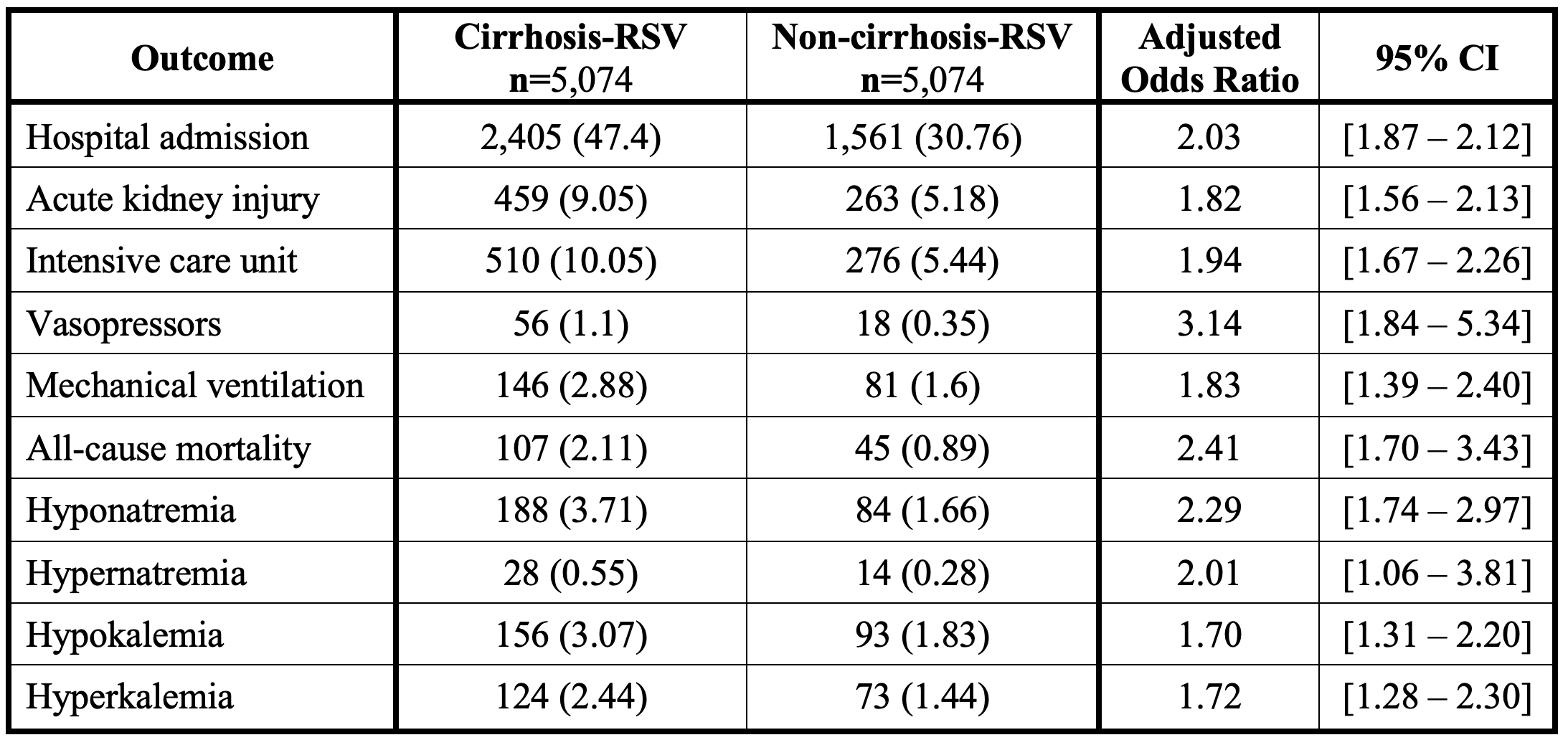Monday Poster Session
Category: Liver
P3768 - Respiratory Syncytial Virus Infection Is Associated With Worse Outcomes in Patients With Liver Cirrhosis: A Propensity-Matched Cohort Study
Monday, October 27, 2025
10:30 AM - 4:00 PM PDT
Location: Exhibit Hall

Abdelkader Chaar, MD
SUNY Upstate Medical University
Syracuse, NY
Presenting Author(s)
Abdelkader Chaar, MD, Avneet Kaur, MBBS, Ahmad Nawaz, MBBS, Idan Goren, MD, Savio John, MD, FACG
SUNY Upstate Medical University, Syracuse, NY
Introduction: Respiratory syncytial virus (RSV) poses significant risks, especially to older adults and individuals with chronic illnesses. While the impact of RSV on various high-risk groups is well-documented, data on its effects in patients with cirrhosis remain limited. This study aimed to evaluate the short-term outcomes of RSV infection in patients with cirrhosis compared to non-cirrhotic patients.
Methods: We conducted a retrospective cohort study using TriNetX, a global multi-institutional federated research database, on adults (≥18 years) diagnosed with RSV between January 2001 and June 2024. Patients were divided into two groups: those with and without cirrhosis. To control for confounders, 1:1 propensity score matching was performed based on age, sex, and medical comorbidities. Matched cohorts were analyzed for 7-day outcomes.
Primary outcomes included hospital admission, acute kidney injury, admission to intensive care unit including utilization of vasopressors or mechanical ventilation, and all-cause mortality. Secondary outcomes assessed electrolyte disturbances, including hyponatremia, hypernatremia, hypokalemia, and hyperkalemia. Adjusted odds ratios (aORs) with 95% confidence intervals (CIs) were calculated.
Results: We identified 5,083 cirrhotic patients and 162,541 non-cirrhotic patients with RSV. Cirrhotic patients were older (mean age 61.5 vs. 52.1 years; p < 0.001) and more often male (45% vs. 38%; p < 0.001). Propensity score matching resulted in 5,074 patients in each group. Cirrhotic patients demonstrated significantly worse outcomes compared to their counterparts. Hospital admission rates were notably higher (aOR 2.03, 95% CI 1.87–2.12), as were incidences of acute kidney injury (aOR 1.82, 95% CI 1.56–2.13) and requirement of intensive care unit (aOR 1.94, 95% CI 1.67–2.26) including vasopressors and invasive ventilation use. All-cause mortality was also increased in cirrhotic patients (aOR 2.41, 95% CI 1.70–3.43). Additionally, electrolyte disturbances were more prevalent among patients with cirrhosis.
Discussion: RSV infection leads to significantly worse clinical outcomes as well as electrolyte disturbances in patients with liver cirrhosis compared to non-cirrhotic patients, reflecting their metabolic instability, immune dysregulation, and heightened vulnerability to acute illnesses. Preventative strategies, including RSV vaccination and proactive clinical management during respiratory infection seasons, should be prioritized for patients with cirrhosis.

Figure: Table 1: Outcomes after 1:1 propensity matching.
Disclosures:
Abdelkader Chaar indicated no relevant financial relationships.
Avneet Kaur indicated no relevant financial relationships.
Ahmad Nawaz indicated no relevant financial relationships.
Idan Goren indicated no relevant financial relationships.
Savio John indicated no relevant financial relationships.
Abdelkader Chaar, MD, Avneet Kaur, MBBS, Ahmad Nawaz, MBBS, Idan Goren, MD, Savio John, MD, FACG. P3768 - Respiratory Syncytial Virus Infection Is Associated With Worse Outcomes in Patients With Liver Cirrhosis: A Propensity-Matched Cohort Study, ACG 2025 Annual Scientific Meeting Abstracts. Phoenix, AZ: American College of Gastroenterology.
SUNY Upstate Medical University, Syracuse, NY
Introduction: Respiratory syncytial virus (RSV) poses significant risks, especially to older adults and individuals with chronic illnesses. While the impact of RSV on various high-risk groups is well-documented, data on its effects in patients with cirrhosis remain limited. This study aimed to evaluate the short-term outcomes of RSV infection in patients with cirrhosis compared to non-cirrhotic patients.
Methods: We conducted a retrospective cohort study using TriNetX, a global multi-institutional federated research database, on adults (≥18 years) diagnosed with RSV between January 2001 and June 2024. Patients were divided into two groups: those with and without cirrhosis. To control for confounders, 1:1 propensity score matching was performed based on age, sex, and medical comorbidities. Matched cohorts were analyzed for 7-day outcomes.
Primary outcomes included hospital admission, acute kidney injury, admission to intensive care unit including utilization of vasopressors or mechanical ventilation, and all-cause mortality. Secondary outcomes assessed electrolyte disturbances, including hyponatremia, hypernatremia, hypokalemia, and hyperkalemia. Adjusted odds ratios (aORs) with 95% confidence intervals (CIs) were calculated.
Results: We identified 5,083 cirrhotic patients and 162,541 non-cirrhotic patients with RSV. Cirrhotic patients were older (mean age 61.5 vs. 52.1 years; p < 0.001) and more often male (45% vs. 38%; p < 0.001). Propensity score matching resulted in 5,074 patients in each group. Cirrhotic patients demonstrated significantly worse outcomes compared to their counterparts. Hospital admission rates were notably higher (aOR 2.03, 95% CI 1.87–2.12), as were incidences of acute kidney injury (aOR 1.82, 95% CI 1.56–2.13) and requirement of intensive care unit (aOR 1.94, 95% CI 1.67–2.26) including vasopressors and invasive ventilation use. All-cause mortality was also increased in cirrhotic patients (aOR 2.41, 95% CI 1.70–3.43). Additionally, electrolyte disturbances were more prevalent among patients with cirrhosis.
Discussion: RSV infection leads to significantly worse clinical outcomes as well as electrolyte disturbances in patients with liver cirrhosis compared to non-cirrhotic patients, reflecting their metabolic instability, immune dysregulation, and heightened vulnerability to acute illnesses. Preventative strategies, including RSV vaccination and proactive clinical management during respiratory infection seasons, should be prioritized for patients with cirrhosis.

Figure: Table 1: Outcomes after 1:1 propensity matching.
Disclosures:
Abdelkader Chaar indicated no relevant financial relationships.
Avneet Kaur indicated no relevant financial relationships.
Ahmad Nawaz indicated no relevant financial relationships.
Idan Goren indicated no relevant financial relationships.
Savio John indicated no relevant financial relationships.
Abdelkader Chaar, MD, Avneet Kaur, MBBS, Ahmad Nawaz, MBBS, Idan Goren, MD, Savio John, MD, FACG. P3768 - Respiratory Syncytial Virus Infection Is Associated With Worse Outcomes in Patients With Liver Cirrhosis: A Propensity-Matched Cohort Study, ACG 2025 Annual Scientific Meeting Abstracts. Phoenix, AZ: American College of Gastroenterology.
